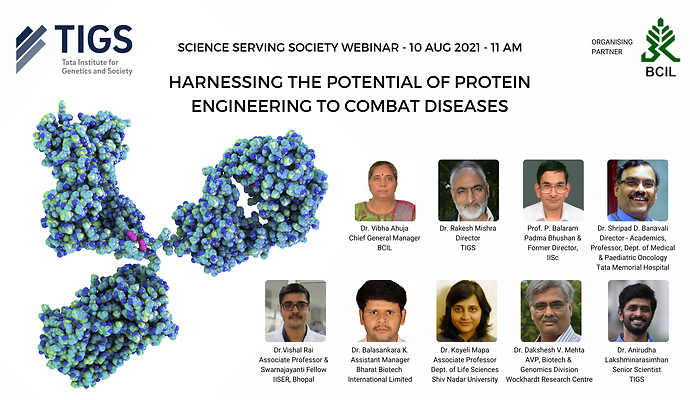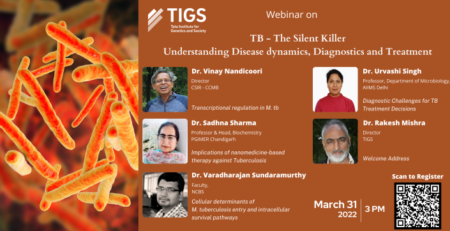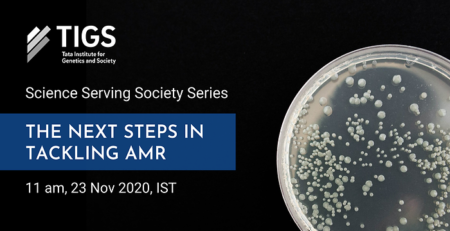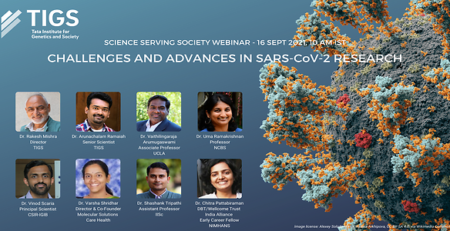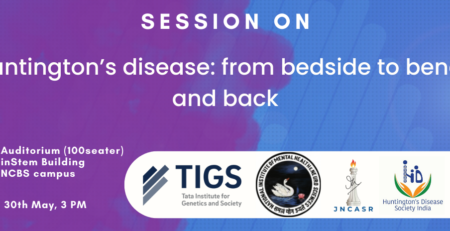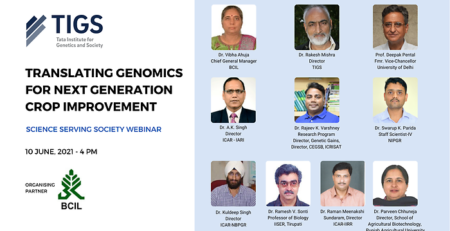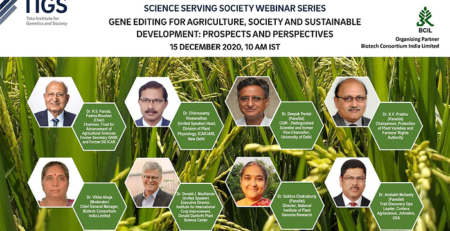Webinar recording
10 August 2021, 11 am IST
Zoom webinar
Welcome address:
Dr. Vibha Ahuja, Chief General Manager, Biotech Consortium India Limited (BCIL)
Chair:
Dr. Rakesh Mishra, Director, TIGS
Presentations:
- Protein Engineering: Not Quite Engineering, But Still Valuable by Prof. P. Balaram, Padma Bhushan & Former Director, Indian Institute of Science
- Recent Advances in Immunotherapies Using Protein Engineering by Dr. Shripad Banavali, Director – Academics, Professor, Department of Medical & Paediatric Oncology, Tata Memorial Hospital
- Protein Engineering and Directed Therapeutics by Dr. Vishal Rai, Associate Professor and Swarnajayanti Fellow, Indian Institute of Science, Education and Research, Bhopal
- Challenges to Developing mAbs Against Infectious Diseases by Dr. Balasankara K., Assistant Manager, Bharat Biotech International Limited
Panel discussion on guided protein engineering towards combating diseases and potential gaps:
- Dr. Koyeli Mapa, Associate Professor, Department of Life Sciences, Shiv Nadar University.
- Dr. Dakshesh V. Mehta, Associate Vice President, Biotech & Genomics Division, Wockhardt Research Center
- Dr. Anirudha Lakshminarasimhan, Senior Scientist, Tata Institute for Genetics and Society
Highlights

Dr. Rakesh Mishra emphasized the potential that protein engineering has in revolutionizing how we currently practice diagnostics and therapeutics. Genome sequencing and transcriptomics has become fast and affordable helping scientists understand proteins better. The COVID-19 pandemic has fast-tracked the application of new technologies such as mRNA therapeutics and this could prove beneficial for other diseases as well. He also stressed upon the development of protein-based interventions for rare genetic diseases prevalent in India. This is a societal need and our responsibility, as commercial organizations are not focused on this area due to several factors including marketability.

Prof. P. Balaram, in his presentation, spoke about the major developments in the field of protein engineering in the last few decades, starting with how it became possible to create proteins with desired functions by means of directed evolution or rational design and ending with the recent breakthrough development in computational biology, AlphaFold and its ability to predict protein structures from their sequence with the use of artificial intelligence. Prof. Balaram also highlighted the example of the coronavirus spike protein, how careful and detailed studies of its structure has enabled the design of effective vaccines and therapeutics in a short period of time.

Dr. Shripad Banavali detailed the benefits that protein engineering has yielded in cancer immunotherapy. New therapies based on checkpoint inhibitors (engineered antibodies that selectively inhibit immunosuppressive pathways in immune cells) and chimeric antigen receptors (CARs – engineered receptors that arm T cells against malignant cells) have revolutionized cancer therapeutics. Techniques such as directed evolution, chemical modification, and antibody/antibody-fragment engineering have aided the development of highly specialized immunotherapeutic proteins such as bispecific antibodies, immunocytokines, bi-specific T-cell engagers (BiTEs), and antibody-drug conjugates.

Dr. Vishal Rai explained the challenges in engineering native proteins and his team’s efforts in addressing them. He talked about the development of the Linchpin Directed Modification (LDM) platform and the advantages it offers: control over homogeneity, flexibility with chemistry and residues of monoclonal antibodies, and regulation of bond strength, linker chemistry, and site of conjugation.

Dr. Balasankara K. talked about technological advances that have been made in the development of monoclonal antibodies, monoclonal antibodies currently available and under development for the treatment of various infectious diseases, and the challenges involved in developing and applying them. He explained the approaches used to develop humanized antibodies.

Dr. Koyeli Mapa talked about how combined efforts with computational biology, experimental approaches, and AI-based approaches could help us understand and predict how rapidly mutating pathogens evolve and design effective therapeutic strategies against them.

Dr. Dakshesh V. Mehta described how protein engineering has enabled the development of more effective drug analogs, such as that seen for insulin. He also addressed the challenges involved in the commercialisation of a product, ensuring that its scalable, robust, consistent, and economical.

Dr. Anirudha Lakshminarasimhan talked about the approaches used in engineering proteins and provided examples of the possibilities that new developments have opened up. He also spoke about some interesting possibilities that could be pursued in the future for derivatives of monoclonal antibodies.

